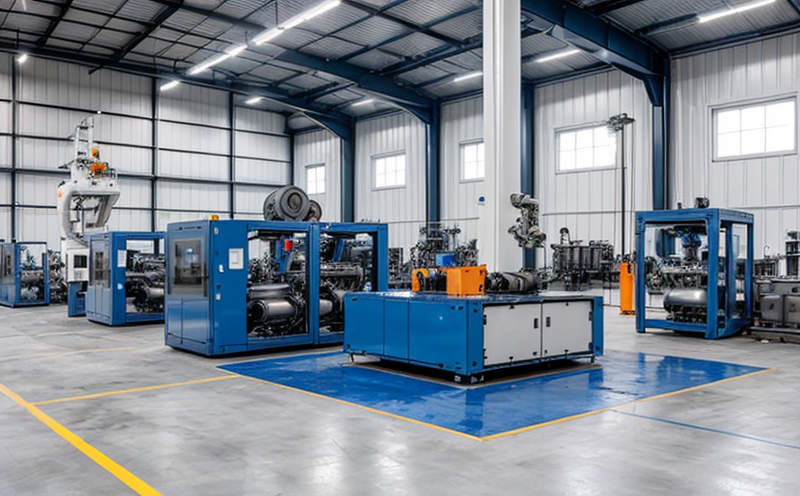
-
Industrial Equipment Certification-
Industrial Equipment Certification for Future Trends-
Certification for Equipment Ready for Industry 4.0
We provide comprehensive solutions designed to help our clients mitigate risks, enhance performance, and excel in key areas such as quality, health & safety, environmental sustainability, and social responsibility.
Discover
For many years, our organization has been operating successfully, boasting modern laboratories that meet international standards. These laboratories are equipped with the latest technology devices and equipment, and we have built a strong team of experienced and trained personnel to operate them.
DiscoverWelcome to Eurolab, your partner in pioneering solutions that encompass every facet of life. We are committed to delivering comprehensive Assurance, Testing, Inspection, and Certification services, empowering our global clientele with the ultimate confidence in their products and processes.
Discover
-
Industrial Equipment Certification-
Industrial Equipment Certification for Future Trends-
Certification for Equipment Ready for Industry 4.0Certification for Equipment Ready for Industry 4.0: Enhancing Competitiveness through Standardization
The advent of Industry 4.0 has brought about a paradigm shift in manufacturing, with the emphasis on digitalization, automation, and connectivity. To remain competitive, manufacturers must ensure that their equipment is equipped to handle the demands of this new era. Certification for Industry 4.0-readiness is becoming increasingly essential, as it validates an organizations ability to meet the standards required for seamless integration into the Industry 4.0 ecosystem.
What Does Industry 4.0-Readiness Mean?
Industry 4.0-readiness refers to an organizations capacity to integrate digital technologies, such as artificial intelligence (AI), Internet of Things (IoT), and data analytics, into their equipment and manufacturing processes. This enables them to respond quickly to changing market demands, improve product quality, reduce production costs, and enhance supply chain efficiency. Industry 4.0-readiness involves a range of aspects, including:
Interoperability: The ability of different systems, devices, and equipment to communicate with each other seamlessly, enabling the free flow of data and real-time communication.
Data Management: The capacity to collect, process, analyze, and visualize vast amounts of data from various sources, providing insights that can drive informed decision-making.
Digital Twin Technology
One of the key technologies driving Industry 4.0-readiness is Digital Twin technology. A Digital Twin is a virtual replica of a physical asset or system, which mirrors its behavior in real-time. This allows for:
Predictive Maintenance: Advanced predictive algorithms can detect potential equipment failures before they occur, enabling proactive maintenance and minimizing downtime.
Real-Time Monitoring: Operators can monitor the performance of equipment and systems remotely, enabling swift responses to changes in production processes.
Simulation-based Training: Digital Twins can be used to simulate complex scenarios, allowing operators to train without disrupting actual operations.
Benefits of Industry 4.0-Readiness Certification
Certification for Industry 4.0-readiness offers numerous benefits to organizations, including:

Food Safety and Testing
Food Safety and Testing: Ensuring the Quality of Our Food As consumers, we expect our food to be sa...

Energy and Sustainability Standards
In today’s rapidly evolving world, businesses face increasing pressure to meet global energy a...

Healthcare and Medical Devices
The Evolution of Healthcare and Medical Devices: Trends, Innovations, and Challenges The healthcare...

Trade and Government Regulations
Trade and government regulations play a vital role in shaping the global economy. These regulations ...

Fire Safety and Prevention Standards
Fire Safety and Prevention Standards: Protecting Lives and Property Fire safety and prevention stan...

Electromechanical Safety Certification
Electromechanical Safety Certification: Ensuring Compliance and Protecting Lives In todays intercon...

Industrial Equipment Certification
Industrial equipment certification is a critical process that ensures industrial equipment meets spe...

Renewable Energy Testing and Standards
Renewable Energy Testing and Standards: Ensuring a Sustainable Future The world is rapidly transiti...

Agricultural Equipment Certification
Agricultural equipment certification is a process that ensures agricultural machinery meets specific...

Hospitality and Tourism Certification
Hospitality and Tourism Certification: Unlocking Opportunities in the Industry The hospitality and ...

Consumer Product Safety
Consumer Product Safety: Protecting Consumers from Harmful Products As a consumer, you have the rig...

Product and Retail Standards
Product and Retail Standards: Ensuring Quality and Safety for Consumers In todays competitive marke...

Lighting and Optical Device Testing
Lighting and Optical Device Testing: Ensuring Performance and Safety Lighting and optical devices a...

Environmental Simulation Testing
Environmental Simulation Testing: A Comprehensive Guide In todays world, where technology is rapidl...

MDR Testing and Compliance
MDR Testing and Compliance: A Comprehensive Guide The Medical Device Regulation (MDR) is a comprehe...

Construction and Engineering Compliance
Construction and Engineering Compliance: Ensuring Safety, Quality, and Regulatory Adherence In the ...

Pharmaceutical Compliance
Pharmaceutical compliance refers to the adherence of pharmaceutical companies and organizations to l...

Battery Testing and Safety
Battery Testing and Safety: A Comprehensive Guide As technology continues to advance, battery-power...

Electrical and Electromagnetic Testing
Electrical and Electromagnetic Testing: A Comprehensive Guide Introduction Electrical and electrom...

NEBS and Telecommunication Standards
Network Equipment Building System (NEBS) and Telecommunication Standards The Network Equipment Bu...

Chemical Safety and Certification
Chemical safety and certification are critical in ensuring the safe management of products and proce...

Transportation and Logistics Certification
Transportation and Logistics Certification: A Comprehensive Guide The transportation and logistics ...

Cosmetic Product Testing
The Complex World of Cosmetic Product Testing The cosmetics industry is a multi-billion-dollar ma...

Pressure Vessels and Installations Testing
Pressure Vessels and Installations Testing Pressure vessels are a critical component of various ind...

Railway Industry Compliance
Railway Industry Compliance: Ensuring Safety and Efficiency The railway industry is a critical comp...

Aviation and Aerospace Testing
Aviation and Aerospace Testing: Ensuring Safety and Efficiency The aviation and aerospace industr...

Military Equipment Standards
Military Equipment Standards: Ensuring Effectiveness and Safety The use of military equipment is a ...

IT and Data Center Certification
IT and Data Center Certification: Understanding the Importance and Benefits The field of Informatio...

Environmental Impact Assessment
Environmental Impact Assessment: A Comprehensive Guide Environmental Impact Assessment (EIA) is a c...

Automotive Compliance and Certification
Automotive Compliance and Certification: Ensuring Safety and Efficiency The automotive industry is ...